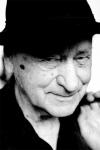Quotes by Jonas Mekas
I'm working in a form of cinema that can be described, and has been described, as a diaristic form of cinema. In other words, with material from my own life. I walk through life with my camera, and occasionally I film. I never think about scripts, never think about films, making films.
When I came to New York in 1949, there was already an entire fresh avant-garde film movement blooming in New York and California. It was a very, very exciting period!
It is important to know that what I do is not artistic. I am just a film-maker. I live how I live and I do what I do, which is recording moments of my life as I move ahead. And I do it because I am compelled to. Necessity, not artistry, is the true line you can follow in my life and work.
We need less perfect but more free films.
There is no other way to break the frozen cinematic conventions than through a complete derangement of the official cinematic senses.
In narrative cinema, a certain terminology has already been established: 'film noir,' 'Western,' even 'Spaghetti Western.' When we say 'film noir' we know what we are talking about. But in non-narrative cinema, we are a little bit lost. So sometimes, the only way to make us understand what we are talking about is to use the term 'avant-garde.'
I'm a filmmaker, but my working procedures are different. All my basic structuring is done during the filming. You know, how long I keep the shot, the exposure or the speed - slower or faster, etc. That's structuring. And then there is a second stage of structuring that comes later when I begin to put those pieces together.
My life is essentially not so unique. On some deeper levels we feel the same, we know the same things. Therefore if I show my life 365 days, moments from those days, it will reflect and it will have connection with lives of all of us.
As a film-maker and a poet, I feel it's my duty to be an eye and an antenna to what's happening around me. I always felt a solidarity with those who are desperate and confused and misused and are seeking a way out of it.
In 1962, we created the Filmmakers' Co-Op because nobody wanted to distribute our films. If we had the Internet in those days, we wouldn't have needed the Co-Op.
In a meadow full of flowers, you cannot walk through and breathe those smells and see all those colors and remain angry. We have to support the beauty, the poetry, of life.
I live, therefore I make films. I make film, therefore I live. Life. Movement. I make home movies, therefore I live. I live, therefore I make home movies.
I have never been able, really, to figure out where my life begins and where it ends. I have never, never been able to figure it all out, what it's all about, what it all means.
Place means nothing to me. I can be at home anywhere.
I myself saw the great works of Western civilization for the first time in my high school in Lithuania in bad black-and-white reproductions on miserable paper. That was, for many years, what art was for me. But from those miserable black-and-white reproductions, I got something, something unmistakable.
The nature of the video camera really makes you focus on the present. Since I have always been a diarist filmmaker, not one who stages scenes with actors, it has always been about the present moment.
Once you change the technology - from a film camera to a video camera, or from an 8-mm camera to 16 mm - you change completely the content. With 8 mm, a leaf on a tree will be made up of maybe four grains. So it's very impressionistic, almost like Seurat. If you switch to 16 mm, the technology gives you hundreds of grains on that leaf.
I'm not so much in the future as always in the present. The future always takes care of itself. What I do now with my video camera, it can only record what is happening now. I am celebrating reality and the essence of the moment. And that's the greatest challenge that I have.
I always work only with friends, but it must be about them and myself. Because I film only very personal moments, nothing preplanned, staged or written, it has to be real and spontaneous. Some of them have become famous, some are not yet famous, some will never be famous. But they are all my friends.
Some cameras are heavier and need to be on tripods. Others are small enough to hide in your pocket. There are places where you don't want to feel like you are disturbing anything, so I may use a camera like that.
I brought Yoko Ono to New York and gave her her first job there. I was editing a magazine called 'Film Culture.'
Most of my videos consist of fragments, one or two minutes long. They are haikus or sketches. I have thousands.
I'm not an abstract artist; I leave that to others. To me, abstract art ended with Kazimir Malevich's 'Black Square.' To continue it is senseless.
In Lithuania, I am known as a poet, and they don't care about my cinema. In Europe, they don't know my poetry; in Europe, I am a filmmaker. But here, in the United States, I am only a maverick!
I am very active on the Internet. In 2007, I made one film every day and posted it on my website. That was a 365-day project, really exhausting, but I still put a lot of stuff on - from life, friends, my own life.






